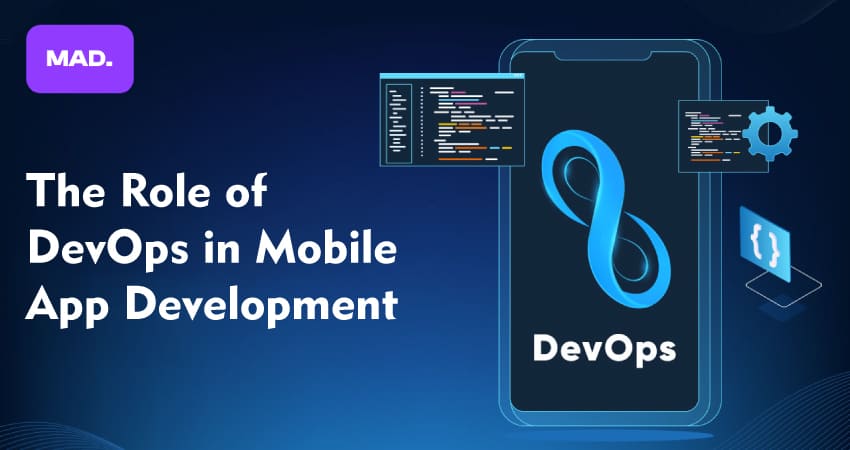New Jersey, USA
-
Location
-
Phone








The Role of DevOps in Mobile App Development

In today's fast-paced digital landscape, mobile applications have become an integral part of daily life. From ordering food and booking rides to managing finances and connecting with others, mobile apps are at the forefront of technological innovation. As the demand for high-quality, reliable, and user-friendly apps continues to surge, developers are faced with the challenge of delivering exceptional products rapidly and efficiently. This is where DevOps comes into play, revolutionizing the mobile app development (MAD) process by bridging the gap between development and operations teams.
“Mobile applications are now integral to daily life, but developers face challenges like device fragmentation, frequent updates, and high-performance expectations. DevOps revolutionizes mobile app development by bridging the gap between development and operations teams through principles like Continuous Integration and Deployment (CI/CD), automation, collaboration, and monitoring. By adopting DevOps, organizations achieve faster deployment times, improved app quality, and a more responsive development cycle. Despite challenges such as security concerns and tool complexity, the benefits include enhanced stability, accelerated time to market, and cost efficiency. As technologies evolve, integrating DevOps will become even more critical for delivering high-quality, user-centric mobile apps.”
Understanding DevOps
DevOps is a cultural and professional movement that emphasizes collaboration, communication, and integration between software developers and IT operations professionals. The primary goal of DevOps is to shorten the system development life cycle while delivering features, fixes, and updates frequently in close alignment with business objectives.At its core, DevOps is founded on several key principles:
1 Continuous Integration (CI)
Developers frequently merge their code changes into a central repository, after which automated builds and tests are run.
2 Continuous Deployment (CD)
Code changes are automatically built, tested, and prepared for production release.
3 Automation
Automating repetitive tasks to increase efficiency and reduce the likelihood of human error.
4 Collaboration and Communication
Encouraging a culture where developers and operations teams work closely together throughout the development process.
5 Monitoring and Logging
Continuously monitoring applications and infrastructure to improve performance and stability.
By adopting these principles, organizations can achieve faster deployment times, improved product quality, and a more responsive development cycle.
Challenges in Mobile App Development
Mobile app development presents unique challenges that distinguish it from traditional software development:1 Device and OS Fragmentation
There is a vast array of devices with different screen sizes, hardware capabilities, and operating system versions. Ensuring compatibility across this spectrum is a significant challenge.
2 Frequent Updates
Mobile users expect regular updates that introduce new features and fix bugs. Delays in delivering updates can lead to user dissatisfaction and a decline in app usage.
3 App Store Regulations
Deploying apps requires compliance with app store guidelines, which can be stringent and time-consuming.
4 Performance Expectations
Users have little tolerance for apps that crash or perform poorly. High performance and stability are essential for user retention.
5 Security Concerns
Mobile apps often handle sensitive user data, necessitating robust security measures to protect against breaches.
Also Read: the-role-of-apis-in-mobile-app-development
The Role of DevOps in Mobile App Development
Integrating DevOps into mobile app development addresses these challenges by streamlining processes and fostering a culture of continuous improvement.
1Continuous Integration and Continuous Deployment (CI/CD)
- Automated Builds and Testing: CI/CD pipelines automate the process of building and testing code every time a change is made. This ensures that code changes do not break the app and that new features work as intended.
- Faster Release Cycles: Automation reduces the time taken to deploy new versions of the app, enabling more frequent updates and quicker delivery of new features to users.
2 Automated Testing
- Unit Testing: Automated unit tests validate individual components of the app, ensuring they function correctly in isolation.
- Integration Testing: These tests ensure that different components of the app work together seamlessly.
- UI/UX Testing: Automated testing tools can simulate user interactions to validate the user interface and experience across different devices and screen sizes.
3Collaboration and Communication
- Cross-functional Teams: DevOps encourages the formation of teams that include developers, testers, operations, and even business stakeholders. This collaboration ensures alignment with the app's objectives and user needs.
- Shared Responsibility: With DevOps, operations teams are involved earlier in the development process, and developers take on more responsibility for how their code runs in production.
4Monitoring and Feedback
- Real-time Monitoring: Implementing monitoring tools allows teams to track app performance and user behavior in real time, identifying issues before they escalate.
- User Feedback Integration: Continuous feedback loops enable teams to incorporate user feedback into development quickly, improving user satisfaction.
5Monitoring and Feedback
- Consistency Across Environments: IaC ensures that development, testing, and production environments are consistent, reducing deployment issues.
- Scalability: Automating infrastructure provisioning allows apps to scale efficiently based on demand.
Benefits of DevOps in Mobile App Development
Adopting DevOps in mobile app development yields numerous benefits that directly impact the success of an app.
1 Enhanced Quality and Stability
Automated testing and continuous monitoring lead to higher-quality code and more stable applications. Early detection of bugs reduces the cost and time associated with fixing issues later in the development cycle.
2 Accelerated Time to Market
Streamlined processes and automation enable faster delivery of features and updates, giving organizations a competitive edge and the ability to respond quickly to market changes.
3 Improved User Experience
Regular updates and rapid incorporation of user feedback enhance the overall user experience, leading to higher user retention and satisfaction.
4 Cost Efficiency
By reducing manual efforts and increasing productivity, DevOps practices help optimize resources and reduce operational costs.
5 Innovation Encouragement
With routine tasks automated, development teams can focus more on innovation and adding value to the product.
Implementing DevOps in Mobile App Development
DevOps in mobile app development requires careful planning and the right tools.
1Selecting the Right Tools
- Version Control Systems: Tools like Git enable collaborative code management.
- CI/CD Platforms: Jenkins, CircleCI, and Bitrise are popular for automating build and deployment processes.
- Automated Testing Frameworks: Tools like Appium and Espresso facilitate automated testing across different devices and platforms.
- Monitoring Solutions: Services like Firebase Crashlytics and New Relic provide insights into app performance and user behavior.
2 Adopting Best Practices
- Incremental Changes: Implement small, manageable increments to reduce risk and simplify troubleshooting.
- Continuous Learning: Encourage a culture of learning and improvement through regular retrospectives and knowledge sharing.
- Security Integration: Incorporate security practices into every stage of development, a practice known as DevSecOps.
3 Cultural Shift
- Leadership Support: Successful DevOps implementation requires commitment from leadership to foster a collaborative environment.
- Team Training: Invest in training programs to equip teams with the necessary skills and knowledge.
- Metrics and KPIs: Establish clear metrics to measure performance and progress, such as deployment frequency and lead time for changes.
Challenges and Considerations
While the benefits of DevOps are significant, organizations may face challenges during implementation.
1 Security Concerns
Automated processes can introduce security risks if not properly managed. It's crucial to integrate security checks into the CI/CD pipeline and stay updated on best practices.
2 App Store Deployments
Unlike web applications, mobile apps require approval from app stores before release. This adds an extra layer to the deployment process, which must be accounted for in the CI/CD pipeline.
3 Cultural Resistance
Shifting to a DevOps model can be met with resistance from teams accustomed to traditional methods. Overcoming this requires clear communication of the benefits and potentially re-aligning team incentives.
4 Tool Complexity
The myriad of tools available can be overwhelming. Selecting and integrating the right tools requires careful consideration and expertise.
Case Studies
1 Uber
Uber adopted DevOps practices to manage its complex mobile app infrastructure. By implementing CI/CD pipelines and automated testing, Uber reduced deployment times and improved app stability, enabling it to scale rapidly across global markets.
2 Netflix
While primarily known for its streaming service, Netflix's mobile app is a critical component of its user experience. Netflix utilizes DevOps to ensure seamless updates and high availability, leveraging automation and monitoring tools to maintain performance standards.
The Future of DevOps in Mobile App Development
As mobile technologies continue to evolve, the role of DevOps in mobile app development will become even more critical.
1 Integration with Artificial Intelligence and Machine Learning
Incorporating AI and ML into DevOps processes can further enhance automation, predictive analytics, and decision-making.
2 Increased Emphasis on Security (DevSecOps)
With growing cyber threats, integrating security deeply into the DevOps process will be essential to protect user data and maintain trust.
3 Expansion of Microservices and Containerization
Using microservices and containers can make apps more modular and scalable. Tools like Docker and Kubernetes are becoming increasingly relevant in mobile app development.
4 Enhanced User Personalization
DevOps practices will enable more dynamic and personalized user experiences by facilitating rapid deployment of tailored features.
Conclusion
DevOps has emerged as a transformative force in mobile app development, addressing the unique challenges of the domain by promoting efficiency, collaboration, and continuous improvement. By embracing DevOps principles, organizations can accelerate their development cycles, improve app quality, and deliver superior user experiences.
Mobile App Development (MAD) is a leading mobile app development company, we understand the critical importance of integrating DevOps into our processes. We ensure our applications are delivered more quickly and adhere to the highest standards of quality and user satisfaction. Our teams are cross-functional and collaborative, breaking down silos to align every aspect of development with your business objectives and user needs.
In partnering with MAD, you are choosing a company that not only delivers exceptional mobile applications but also one that is dedicated to innovation and excellence. We believe that the power of DevOps lies in its ability to transform challenges into opportunities, driving the success of your mobile app in a competitive market. Let us help you harness this power to create user-centric, high-quality apps that stand out and make a lasting impact.
MAD is a top app development company in the USA, a high-performance low-code platform that enables rapid and easy mobile app development compared to traditional coding methods.


